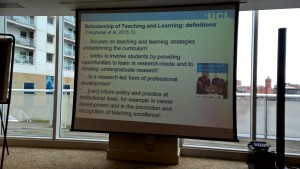Dec
2015
20th Annual SEDA Conference Keynote Address ‘Strength-based Scholarship: Pushing the Boundaries of Scholarship and Self’ Dr Dilly Fung, Director UCL Centre for Advancing Learning and Teaching (CALT), University College London
Dilly started by focusing on how sometimes language can be a barrier and SOTL is seen by some to have boundaries. Boyer’s (1990) 4 elements have been integrated by many over the years and are familiar as are some of the definitions that Dilly shared in the session. The term education is used by many education leaders rather than teaching or learning because it does reflect the breadth of the educational role. Scholarship can then be linked more easily to research. There is also a need to distinguish between teaching excellence and impact on education. Dilly discussed some theoretical framing and how Bildung’s concept of self-cultivation was useful as we develop both our thoughts around education and philosophy. We develop through authentic dialogue which leads to a collective journey. To continue our journeys “the human mind needs to remain “unsatisfied” with what it imagines it knows (Fairfield 2010:3).
Dilly then focused on the connected curriculum developed at UCL and that this was about learning through research and inquiry. Students connect with staff and their world-leading research. There is a line of research activity built into each programme and students make connections across subjects and out into the world. Students connect academic learning with workplace learning. Students learn to produce outputs directed at specific audiences and they connect with one another and alumni. Expressions of scholarship can be rich and varied and can include:
- formal written argument
- numeric analysis
- presentations
- dialogue and knowledge exchange
- graphical representation
- visual modes of expression
- creative modes such as fine art, film and music
- creative writing…
Our scholarship must allow other cultures to influence our work and we need to look at how we can include other knowledge. We need to play to individual strengths, build on values and passions and be intellectually curious. We need to find ways for others voices to come through and use authentic modes of enquiry and expression. We need to respect diverse modes of expression and so reviewing assessments is a positive action.
We should review role descriptions to ensure education focused scholarship is a desirable activity and reward scholars for their work.
